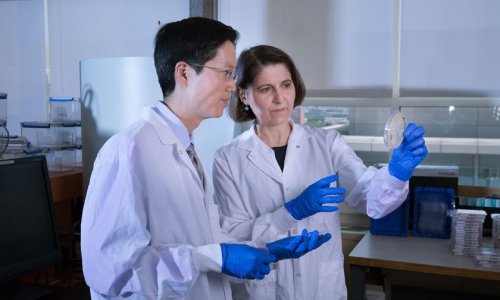Hygiene problems in European hospitals
Worldwide, antibiotic resistance is one of the three major challenges for public health according to the European Society of Clinical Microbiology and Infectious Diseases (ESCMID). What needs to be done? Anja Behringer reports.

Every year 37,000 people die of nosocomial infections in European hospitals; 4.1 million patients contract healthcare-associated infections – that is every tenth patient in Europe, as EU Health Commissioner John Dalli recently pointed out.
The causes are well known: first, antibiotic resistance; then the fact that more and more elderly and multi-morbid patients who carry the MRSA pathogen are admitted to hospitals and thirdly the shortage of professional medical staff. For example, Germany has 2,000 hospitals but only 70 hospital hygiene specialists. A hospital hygiene department is usually organised around out-patient, clinical and surgical tasks while clinical professions focus on either primary care, specialisation or management and are faced with an increasing need and demand for additional qualifications and even more specialised knowledge.
The German ‘physician landscape’, for example, clearly shows that geriatric care is seriously understaffed and that projects to link in- and out-patient care are urgently needed. As far as out-patient care is concerned some German States record a shortage of physicians, whereas in the clinical sector only large institutions are adequately staffed.
In the next few years the care demand at the interface of in- and out-patient care is expected to increase further and care management will play a crucial role. The entire process needs to be optimised and its inherent problems need to be controlled. No doubt new skills and competencies will be required also – what exactly these skills will or should be is currently being hotly debated in the different professional associations.
Qualification and certification are buzzwords but no one dares to venture a prognosis as to the results. The demands are not new; today the discussion is all about implementation. As long as handshakes are common in hospitals and as long as simple hygiene principles are neglected due to staff and time pressures, the prettiest framed certificate on the wall has little value. The German Hospital Society has quite a dry perspective on the issue: ‘In the short term we cannot train the number of hygiene specialists that we need.’
At the University of Witten/Herdecke teaching hospital the hygiene manager founded a hygiene group to raise awareness of the dangers the invisible bacteria pose. A hygiene specialist monitors compliance with the guidelines, which cover areas such as the use of disinfectants, a strict dress code particularly in the ICU and the operating theatre, isolation and antibacterial care of MRSA patients.
The new German Infection Protection Act 2011 tightens the rules. Thus, for example, MRSA incidences must be reported faster and hygiene plans have to be drafted. To date there are no comprehensive studies that assess additional hygiene measures using evidence-based criteria. The research results are ambiguous. Guidelines from the US-American Healthcare Infection Control Practices Advisory Committees (HICPAC) on the handling of multi-resistant micro-organisms in the context of medical care do not offer clear recommendations regarding active screening, whilst Dutch guidelines do recommend active screening for certain patient groups.
In Germany, recommendations for effective hygiene measures are urgently needed. Several hospital hygiene specialists in Baden-Württemberg suggested the development of hygiene standards taking into account the type of resistance and the type of in-patient care the patients are receiving. Such recommendations would distinguish between standard hygiene measures, extended measures including coat, gloves, patient-specific care utensils and single toilet (barrier isolation), single room isolation or cohort isolation. Hand hygiene compliance is of utmost importance as is the responsible use of antibiotics.
Patients can help to contain MRSA by, for example, having their GP test them for MRSA colonisation before hospital admission.
In any hospital hygiene plans and their accurate implementation are an absolute must – a mist that requires well-trained and sufficient staff.
15.02.2012





